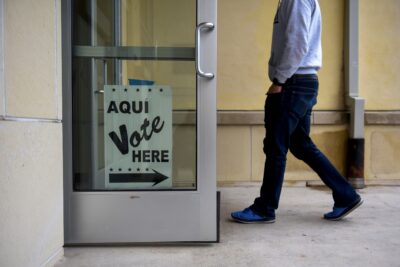The Texas secretary of state’s office has asked the state’s attorney general to investigate a mailer sent by the state’s Democratic Party this year that critics say could entice noncitizens to register to vote.
The mailer, sent out in late September and early October, included a voter registration form for the recipient to fill out. Though most of the form was left blank, a checkbox indicating that the person filling out the form was a U.S. citizen was pre-checked.
In response, the secretary of state’s office received an “inordinate number” of calls from perplexed noncitizens, relatives of deceased individuals and already-registered voters in the days leading up to the state’s Oct. 9 registration deadline, according to Sam Taylor, director of communications for the secretary of state.
“It wasn’t just anybody calling. It was people who were confused — green-card holders, not full citizens — asking, ‘Does this mean I can vote now?’” Taylor said.
Keith Ingram, the state’s director of elections, referred the complaint to the attorney general’s office on Monday, writing that the mailers warrant a criminal investigation into whether a Class B misdemeanor was committed by inducing “another person to make a false statement on a voter registration application.”
The attorney general’s office told ProPublica it does not comment on potential investigations.
Manny Garcia, the deputy executive director of the Texas Democratic Party, denied that the group intended noncitizens to complete the form. He said the group used the state’s voter file, national change-of-address information and other consumer data to compile the list of recipients.
Commercially available consumer mailing lists, as well as national change-of-address lists, can include both citizens and noncitizens.
Garcia said that the list of recipients may have been imperfect, but he defended the mailers, telling ProPublica that “every person who fills out the applications is signing under penalty of perjury to the accuracy of this information.”
“The Texas Democratic Party is proud to have made an unprecedented investment to provide eligible Texans with the opportunity to vote,” he wrote in a statement.
The form sent by the Texas Democrats also includes pre-checked boxes confirming that the person filling out the form will be 18 or older by Election Day, and that it is a new application. Texas voter registration does not include party affiliation.
It asks people to fill in a Social Security or driver’s license number, or to check a box if they have neither. Texas driver’s licenses are available to noncitizens with a “lawful presence” in the U.S.
Asked why the form has the citizenship question pre-checked, Garcia said it was done to make it quicker for individuals to complete the form. Garcia would not comment on Monday’s referral to the attorney general.
It is not yet known if any noncitizens actually used the mailers to register illegally, but given the confusion among recipients, it remains a possibility. Critics argued that the pre-checked forms were misleading and could encourage legal noncitizens to submit voter registration forms — and with Monday’s referral, the secretary of state’s office seems to agree.
David Kifuri Jr., who lives in the Texas border town of Rio Grande City, said his mother, who is in the process of getting her citizenship, questioned whether she could vote after receiving the letter. “She called me and said, ‘Hey, do you think I’m eligible to vote because I received this thing saying I’m eligible to register?’” Kifuri said. “This can get people in trouble.”
Kifuri submitted an affidavit alongside a letter from the Public Interest Legal Foundation, a controversial conservative group that has claimed, without solid evidence, that voter fraud occurs on a large scale. That letter was sent to a handful of counties, as well as the state’s attorney general, secretary of state and U.S. attorney, urging authorities to investigate the mailers.
“There’s nothing wrong with putting a voter registration form in the mail. The error is that they altered the form. They made it that much easier for ineligible people to sign it,” said Logan Churchwell, a spokesperson for PILF.
When ineligible voters do manage to register and cast a ballot, it is often the result of confusion and misinformation on the part of authority figures, according to Clark Birdsall, a criminal defense attorney in Dallas who represented a green-card holder sentenced to eight years in prison in 2017 after voting illegally in the 2012 and 2014 elections.
“It’s hard to believe any responsible Democratic organization would do something like this,” Birdsall said. “It is a mistake. I think it was an irresponsible decision.”
The secretary of state’s office told ProPublica that there are systems in place to prevent noncitizens from registering. However, there is no comprehensive federal list of who is a citizen, so the checks can be inconclusive. New voter registrations are cross-checked against a list of people who indicated they are not citizens in response to jury summons and are cross-checked against a list of people who have died.
The state also relies on the fact that the voter affirms under penalty of perjury that the information in a registration application is true, and county registrars have the power to request proof of citizenship if they suspect a person is not eligible to vote.
In the event that a noncitizen registered to vote using one of the forms that was pre-checked, that person can request to be removed from the rolls, as permitted by the National Voter Registration Act, according to Taylor.
Texas Gov. Greg Abbott, who is up for re-election, tweeted last week from his personal campaign account that the mailers were “being investigated.” James Dickey, the chairman of the Republican Party of Texas, praised the secretary of state’s handling of the complaint, writing in a press release that “the right to vote in the United States is reserved for American citizens and any attempt to subvert our process degrades the integrity of every voter’s ballot.”
Filed under:








